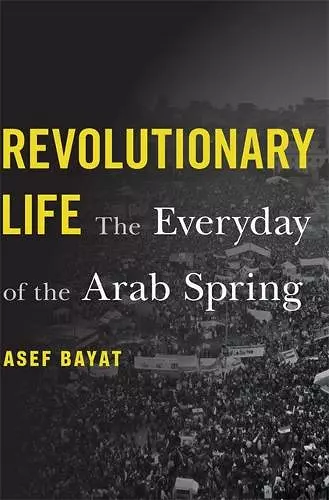Revolutionary Life
The Everyday of the Arab Spring
Format:Hardback
Publisher:Harvard University Press
Published:10th Dec '21
Should be back in stock very soon

From a leading scholar of the Middle East and North Africa comes a new way of thinking about the Arab Spring and the meaning of revolution.
From the standpoint of revolutionary politics, the Arab Spring can seem like a wasted effort. In Tunisia, where the wave of protest began, as well as in Egypt and the Gulf, regime change never fully took hold. Yet if the Arab Spring failed to disrupt the structures of governments, the movement was transformative in farms, families, and factories, souks and schools.
Seamlessly blending field research, on-the-ground interviews, and social theory, Asef Bayat shows how the practice of everyday life in Egypt and Tunisia was fundamentally altered by revolutionary activity. Women, young adults, the very poor, and members of the underground queer community can credit the Arab Spring with steps toward equality and freedom. There is also potential for further progress, as women’s rights in particular now occupy a firm place in public discourse, preventing retrenchment and ensuring that marginalized voices remain louder than in prerevolutionary days. In addition, the Arab Spring empowered workers: in Egypt alone, more than 700,000 farmers unionized during the years of protest. Labor activism brought about material improvements for a wide range of ordinary people and fostered new cultural and political norms that the forces of reaction cannot simply wish away.
In Bayat’s telling, the Arab Spring emerges as a paradigmatic case of “refolution”—revolution that engenders reform rather than radical change. Both a detailed study and a moving appeal, Revolutionary Life identifies the social gains that were won through resistance.
Bayat, a sociologist and an acute chronicler of everyday life in the Middle East and North Africa, explores the fate of marginalized people in the uprisings of the Arab Spring. -- Lisa Anderson * Foreign Affairs *
Stands out…for its brilliance and lack of sentimentality…Focusing on Egypt and Tunisia, Bayat’s argument is that the events of 2011 set something radical in motion and imposed a new set of social relations onto everyday life. The book is rich with examples of this everyday resistance from both countries. -- Nihal El Aasar * Jacobin *
Pioneers an important topic…By diving deeper into overlooked and marginal groups, Bayat reveals the dynamics of ordinary people disregarding individual ideals and participating in something exceptional. Revolutionary Life is a study of the ordinary that is anything but. -- Elizabeth Pipes * Middle East Quarterly *
[Bayat] has been a sure-footed observer of revolutions for decades…Although the Arab revolts appear to have largely failed, Bayat argues that even revolutions that do not reach the pinnacle of power leave behind lasting change. -- Ray Takeyh * Survival: Global Politics and Strategy *
This remarkable book uncovers how mass revolutionary uprisings shape—and are shaped by—the everyday experiences of people from all walks of life. In Revolutionary Life, Asef Bayat has delivered another tour de force. -- Erica Chenoweth, Frank Stanton Professor of the First Amendment, Harvard University
Through finely detailed studies of the uprisings in Tunisia and Egypt, highlighting the lives of the poor and subaltern, Bayat illuminates the gap between changing political structures and transforming everyday life that contemporary revolutions everywhere must bridge. He makes an important and timely argument about how, although they did not significantly change state power, the Arab Spring revolutions gave rise to new subjectivities and a new political imaginary, which could be powerful resources for the future. -- Michael Hardt, Professor of Literature, Duke University
While revolutions are mostly made from below, through mass mobilization of ordinary people, they are usually narrated from above. Reversing that perspective, Asef Bayat explains the development of the Arab Spring by analyzing the everyday life of the subaltern. Most innovative for the study of extraordinary moments and their outcomes is the importance he gives to the transformations in people’s subjectivities, expectations, and practices as a trigger for, but also a constraint upon, social and political change. Empirically rich and theoretically provoking, this is a must-read book for all those interested in contentious politics. -- Donatella della Porta, Professor of Political Science, Scuola Normale Superiore
ISBN: 9780674987890
Dimensions: unknown
Weight: unknown
336 pages